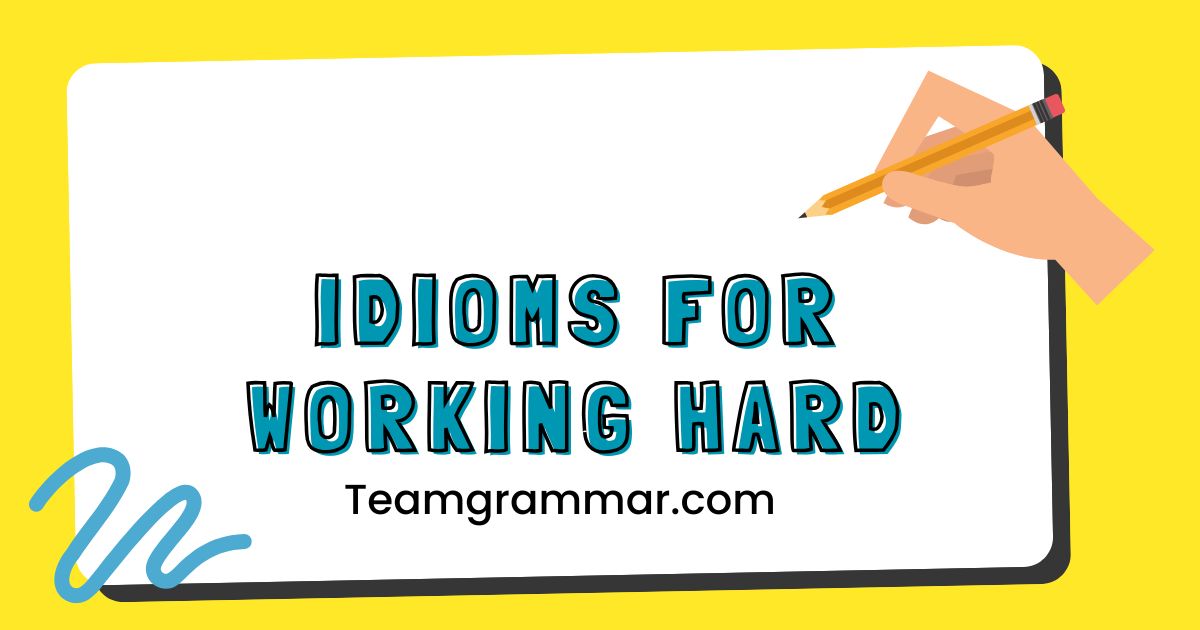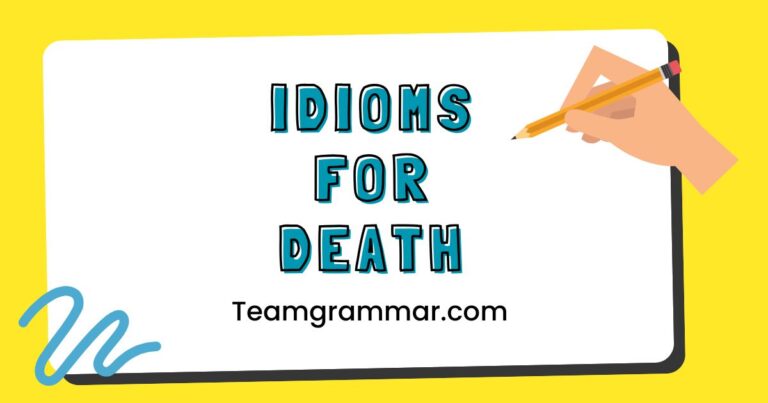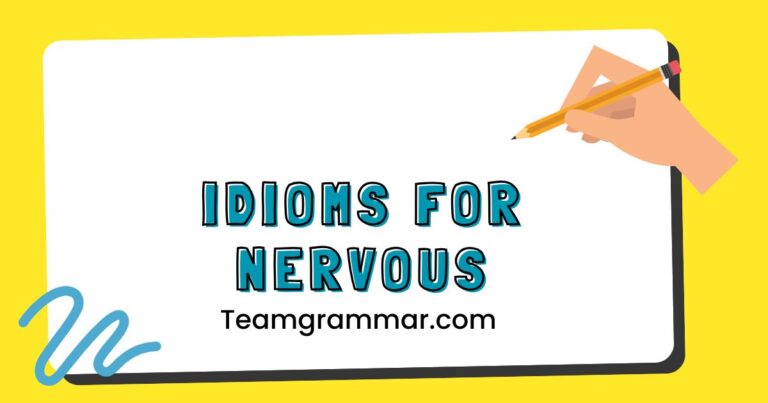29 Idioms for Working Hard: Mastering English Expressions
Understanding idioms is crucial for mastering English, especially when describing effort and dedication. Idioms for working hard add color and depth to your language, making your communication more engaging and natural.
This article provides a comprehensive guide to these idioms, exploring their meanings, structures, and usage. Whether you’re an ESL learner or a native speaker looking to refine your vocabulary, this guide will equip you with the knowledge to effectively use idioms related to hard work.
Table of Contents
- Introduction
- Definition of Idioms for Working Hard
- Structural Breakdown
- Types and Categories of Idioms for Working Hard
- Examples of Idioms for Working Hard
- Usage Rules for Idioms for Working Hard
- Common Mistakes with Idioms for Working Hard
- Practice Exercises
- Advanced Topics
- FAQ
- Conclusion
Introduction
Idioms are phrases or expressions whose meanings cannot be understood from the ordinary meanings of the individual words. They add richness and nuance to the English language, making communication more colorful and engaging.
Learning idioms related to hard work is particularly valuable as it allows you to express dedication, perseverance, and effort in a more vivid and relatable way. This article is designed for English language learners and native speakers alike who wish to expand their vocabulary and improve their understanding of idiomatic expressions in the context of hard work.
By understanding the structure, types, and usage of idioms for working hard, you can enhance your ability to communicate effectively in both professional and casual settings. Mastering these idioms will not only improve your comprehension of spoken and written English but also enable you to express yourself with greater precision and flair.
This guide offers numerous examples, practice exercises, and helpful tips to make your learning journey both comprehensive and enjoyable.
Definition of Idioms for Working Hard
Idioms for working hardare expressions that describe the act of putting in significant effort, dedication, and perseverance to achieve a goal. These idioms often use figurative language to convey the intensity and commitment involved in hard work.
They are a subset of general English idioms, focusing specifically on the theme of labor and diligence.
Classification
Idioms can be classified based on their structure and the type of figurative language they employ. Some idioms are metaphorical, using comparisons to convey meaning (e.g., “burn the midnight oil”), while others are based on metonymy, where a related concept represents the whole (e.g., “put your shoulder to the wheel”).
Additionally, idioms can be classified based on their formality, ranging from informal expressions used in casual conversation to more formal idioms suitable for professional settings.
Function
The primary function of idioms for working hard is to express the concept of diligent effort in a more vivid and memorable way than literal language. They add emphasis and emotional weight to descriptions of work, making them more impactful.
Idioms can also serve to create a sense of camaraderie and shared understanding among speakers, as they often reflect cultural values and attitudes towards work.
Contexts
Idioms for working hard are used in a variety of contexts, including:
- Professional settings: Describing team performance, employee evaluations, and project reports.
- Educational settings: Encouraging students, discussing study habits, and evaluating academic performance.
- Personal conversations: Sharing experiences, offering encouragement, and expressing admiration for someone’s efforts.
- Literature and media: Adding depth and authenticity to characters and narratives.
Structural Breakdown
Understanding the structure of idioms is crucial for using them correctly. Idioms often consist of a combination of words that, when taken individually, do not convey the same meaning as the idiom as a whole.
The structure can vary, but common patterns include:
- Verb + Noun: Hit the books, Burn the midnight oil
- Verb + Preposition + Noun: Put your shoulder to the wheel, Go the extra mile
- Adjective + Noun: Dogged determination
- Phrasal Verbs: Plug away, Knuckle down
The meaning of an idiom is not always deducible from its individual components. For example, “burn the midnight oil” literally refers to burning oil in a lamp, but idiomatically it means to work late into the night.
The figurative meaning is what makes it an idiom.
It is also important to note that idioms are often fixed expressions, meaning that their form cannot be altered without changing their meaning or rendering them nonsensical. For instance, saying “burn the early evening oil” instead of “burn the midnight oil” would not be understood as an idiom.
Types and Categories of Idioms for Working Hard
Idioms for working hard can be categorized based on the specific aspect of hard work they emphasize. Here are some common categories:
1. Effort and Exertion
These idioms describe the physical or mental effort involved in hard work.
2. Dedication and Commitment
These idioms highlight the dedication and commitment required to achieve a goal.
3. Perseverance and Persistence
These idioms emphasize the importance of continuing to work hard despite challenges and setbacks.
4. Overwork and Exhaustion
These idioms describe the negative consequences of working too hard, such as exhaustion and burnout.
5. Productivity and Achievement
These idioms focus on the positive outcomes of hard work, such as increased productivity and achievement.
Examples of Idioms for Working Hard
Here are several examples of idioms for working hard, categorized by the aspects they emphasize. Each table contains a variety of idioms with explanations and example sentences to illustrate their usage.
Table 1: Effort and Exertion
This table showcases idioms that emphasize the effort and physical or mental exertion involved in hard work.
| Idiom | Meaning | Example Sentence |
|---|---|---|
| Burn the midnight oil | Work late into the night | She had to burn the midnight oil to finish the project on time. |
| Sweat blood | Work extremely hard | He sweated blood preparing for the exam. |
| Work your fingers to the bone | Work extremely hard, often to the point of exhaustion | They worked their fingers to the bone to provide for their family. |
| Pull your weight | Do your fair share of the work | Everyone needs to pull their weight on this project. |
| Go the extra mile | Do more than what is expected | She always goes the extra mile for her clients. |
| Put your shoulder to the wheel | Apply oneself with energy and determination | If we all put our shoulder to the wheel, we can finish this quickly. |
| Keep your nose to the grindstone | Work hard and steadily | He keeps his nose to the grindstone to achieve his goals. |
| Be up to your eyes/ears in work | To be very busy | I’m up to my eyes in work this week, so I can’t go out. |
| Hammer away at something | To work hard and persistently at something, often something difficult | She hammered away at the report for hours, trying to get it perfect. |
| Plug away | To continue working hard at something, even if it is difficult or boring | Despite the challenges, he plugged away at his studies and eventually graduated. |
| Slave away | Work very hard with little or no rest | She slaved away in the kitchen all day preparing for the party. |
| Toil away | Work extremely hard for a long period of time | The farmers toiled away in the fields from dawn till dusk. |
| Break a sweat | Make a significant effort | He didn’t even break a sweat during the marathon. |
| Give it your all | Put in maximum effort | She gave it her all during the performance. |
| Bend over backwards | Try very hard to help someone | He bent over backwards to accommodate their requests. |
| Strain every nerve | Make a great effort | She strained every nerve to win the competition. |
| Go all out | Make a maximum effort | They went all out to make the event a success. |
| Knuckle down | Start working hard | It’s time to knuckle down and finish this project. |
| Put your back into it | Work with great effort | He put his back into it and lifted the heavy box. |
| Work like a dog | Work very hard | She works like a dog to support her family. |
| Run around like a headless chicken | To be very busy and not know what to do first | Without a manager, the team was running around like headless chickens. |
| Be snowed under | To have too much work to deal with | I’m snowed under with paperwork this week. |
| Get stuck in | To start doing something with enthusiasm and energy | The new intern got stuck in right away and made a big difference. |
Table 2: Dedication and Commitment
This table includes idioms that emphasize the dedication and commitment involved in hard work.
| Idiom | Meaning | Example Sentence |
|---|---|---|
| Be wedded to your work | To be extremely dedicated to your work | He is wedded to his work and rarely takes a day off. |
| Be committed to the cause | To be dedicated to a particular goal or purpose | She is committed to the cause of environmental protection. |
| Go the whole hog | To do something completely and thoroughly | They decided to go the whole hog and renovate the entire house. |
| Be in it for the long haul | To be committed for a long period of time | She is in it for the long haul and plans to stay with the company for many years. |
| All in | Fully committed | He’s all in on this project, dedicating all his time and energy. |
| Put your heart and soul into something | To dedicate all your energy and passion to a task | She put her heart and soul into the performance, making it unforgettable. |
| Be devoted to | Extremely dedicated to a person, activity, or cause | He’s devoted to his research, spending countless hours in the lab. |
| Live and breathe something | To be completely absorbed in and passionate about something | She lives and breathes her art, constantly creating new pieces. |
| Go to great lengths | To try very hard to achieve something | He went to great lengths to ensure the project’s success. |
| Be hell-bent on | To be determined to do something, even if it’s difficult | She’s hell-bent on finishing the marathon, no matter how tough it gets. |
| Give 110% | To give more effort than is expected | He always gives 110% in everything he does. |
| Be wrapped up in | To be very involved in something | She’s wrapped up in her new job and loves every minute. |
| Stand by someone | To support someone through difficult times | He stood by his friend during the trial. |
| Go above and beyond | Do more than is required | She went above and beyond to help the team succeed. |
| Stick to your guns | Maintain your beliefs despite opposition | He stuck to his guns and defended his principles. |
| Stay the course | Continue despite difficulties | They decided to stay the course and see the project through. |
| Take the bull by the horns | Confront a difficult situation directly | He took the bull by the horns and resolved the conflict. |
| Be all in | Fully committed | He’s all in on this project, dedicating all his time and energy. |
| Be passionate about | To have a strong enthusiasm for something | She’s passionate about her work as a teacher. |
| Be dedicated to | To be committed to a goal or purpose | He’s dedicated to improving the community. |
| Go the distance | To persevere to the end | Even though it was tough, she went the distance and finished the race. |
| Be in it to win it | To be fully committed to achieving success | The team was in it to win it, giving their best effort in every game. |
| Be single-minded | To have one clear aim and focus all your efforts on it | She was single-minded in her pursuit of a medical degree. |
Table 3: Perseverance and Persistence
This table presents idioms that emphasize the importance of continuing to work hard despite challenges and setbacks.
| Idiom | Meaning | Example Sentence |
|---|---|---|
| Hang in there | Persist and don’t give up | Hang in there; you’re almost finished with the project! |
| Keep at it | Continue working on something | Keep at it, and you’ll eventually master the skill. |
| Stick with it | Continue with something despite difficulties | Stick with it, even when the going gets tough. |
| Press on | Continue forward despite difficulties | Despite the setbacks, we must press on. |
| Push through | Overcome obstacles and continue | They had to push through several challenges to complete the project. |
| Never say die | Never give up | He never says die, no matter how difficult the situation. |
| Keep your chin up | Stay positive and hopeful | Keep your chin up; things will get better. |
| Weather the storm | Survive a difficult period | They managed to weather the storm and come out stronger. |
| Hold your ground | Maintain your position despite opposition | He held his ground and defended his beliefs. |
| Stand your ground | Refuse to be pushed over or intimidated | She stood her ground and refused to back down. |
| Keep plodding on | Continue steadily despite difficulties | He kept plodding on with his studies, even when he felt discouraged. |
| Keep the faith | Maintain belief in a positive outcome | Keep the faith; things will eventually work out. |
| Stay strong | Remain resilient in the face of adversity | Stay strong during these challenging times. |
| Fight tooth and nail | Struggle fiercely to achieve something | They fought tooth and nail to win the contract. |
| Give it your best shot | Make the best effort possible | Give it your best shot, and you might surprise yourself. |
| Go for it | Take a chance and try your best | Go for it; you have nothing to lose. |
| Leave no stone unturned | Search thoroughly and exhaust all possibilities | They left no stone unturned in their search for the missing child. |
| Press forward | Continue moving ahead despite obstacles | They pressed forward with their plans, despite the challenges. |
| Persevere through | Continue despite difficulties | She persevered through the difficult training program. |
| Don’t take no for an answer | Be persistent and refuse to give up | He doesn’t take no for an answer and always finds a way. |
| Rise to the occasion | To successfully deal with a difficult situation | When the project was in danger, she rose to the occasion and saved the day. |
| Keep going | To continue despite difficulties | Even though he was tired, he kept going until he finished the task. |
| See something through | To continue until completion | She was determined to see the project through, no matter how hard it got. |
Table 4: Overwork and Exhaustion
This table presents idioms that describe the negative consequences of working too hard, such as exhaustion and burnout.
| Idiom | Meaning | Example Sentence |
|---|---|---|
| Burnout | Physical or mental collapse caused by overwork or stress | He suffered from burnout after working non-stop for months. |
| Run ragged | Exhausted from overwork | She’s been run ragged trying to manage everything. |
| On your last legs | Near collapse due to exhaustion | After the marathon, he was on his last legs. |
| Wear yourself out | Become exhausted through overwork | Don’t wear yourself out trying to do everything at once. |
| Drive yourself into the ground | Push yourself to exhaustion | He drove himself into the ground trying to meet the deadline. |
| Be dead on your feet | Extremely tired | After working two shifts, she was dead on her feet. |
| Flat out | Extremely busy and working hard | We’ve been flat out all week trying to finish the project. |
| Spread yourself too thin | To try to do too many things at once, so that you cannot give enough time or attention to any of them | She spread herself too thin by taking on too many projects at once. |
| Run out of steam | To lose energy or enthusiasm | After working on the project for months, he ran out of steam. |
| At the end of your tether | Having no strength or patience left | By the end of the week, she was at the end of her tether. |
| Dog-tired | Extremely tired | After the hike, we were all dog-tired. |
| On your last nerve | Extremely irritated or annoyed | The constant noise was getting on her last nerve. |
| Frazzled | Completely exhausted and stressed | She felt frazzled after dealing with the demanding clients. |
| Burnt to a crisp | Completely exhausted | He felt burnt to a crisp after working overtime all week. |
| Worn to a frazzle | Extremely tired and stressed | She was worn to a frazzle after the hectic schedule. |
| Running on fumes | Operating with very little energy or resources | After the all-nighter, he was running on fumes. |
| Beaten | Exhausted and defeated | She felt beaten after the long and challenging day. |
| Pooped | Very tired | After the workout, he was completely pooped. |
| Drained | Depleted of energy | She felt drained after the emotionally taxing meeting. |
| Sapped | Having energy or strength depleted | The heat sapped his energy. |
| Pushing yourself too hard | Exerting too much effort, often to the point of exhaustion | She was pushing herself too hard and needed to take a break. |
| Overdoing it | Exceeding reasonable limits | He was overdoing it by working late every night. |
| Burning the candle at both ends | Working very hard and staying up late | She’s burning the candle at both ends trying to balance work and family. |
Table 5: Productivity and Achievement
This table focuses on idioms that highlight the positive outcomes of hard work, such as increased productivity and achievement.
| Idiom | Meaning | Example Sentence |
|---|---|---|
| Reap the rewards | Enjoy the benefits of your hard work | After years of hard work, they are finally reaping the rewards. |
| Bear fruit | Produce positive results | Their efforts finally bore fruit when the project was completed successfully. |
| Pay off | Result in success or benefit | All the hard work paid off when she got the promotion. |
| Hit the jackpot | Have great success or luck | They hit the jackpot with their new invention. |
| Make headway | Make progress | We’re finally making headway on the project. |
| Move mountains | Achieve something that seems impossible | She moved mountains to make the event a success. |
| Get results | Achieve a desired outcome | His hard work got results, leading to increased sales. |
| Make strides | Make significant progress | The team is making strides in their research. |
| Turn a corner | Improve after a difficult period | The company has finally turned a corner and is now profitable. |
| Come a long way | Make significant progress | She’s come a long way since she started learning English. |
| Reach for the stars | Aim for ambitious goals | He always encourages his students to reach for the stars. |
| Achieve your dreams | Fulfill your aspirations | With hard work and dedication, you can achieve your dreams. |
| Reach your full potential | Develop your abilities to the maximum | The program helps students reach their full potential. |
| Make a name for yourself | Become well-known and respected | She made a name for herself in the industry through hard work. |
| Climb the ladder | Advance in a career | He’s been climbing the ladder in the company for years. |
| Break the mold | Do something in a new and innovative way | She broke the mold with her unique approach to marketing. |
| Blaze a trail | Be a pioneer in a particular field | He blazed a trail in the field of renewable energy. |
| Set the bar high | Establish a high standard of achievement | They set the bar high with their outstanding performance. |
| Raise the bar | Improve standards or expectations | The company is always striving to raise the bar. |
| Come out on top | Be successful after a difficult period | They came out on top despite the challenges. |
| Have something to show for your efforts | To have visible results from your hard work | After months of training, she had something to show for her efforts: a gold medal. |
| Reap what you sow | To experience the consequences of your actions | If you work hard, you’ll reap what you sow and achieve success. |
| Have a good track record | To have a history of success | He has a good track record in the company, always delivering excellent results. |
Usage Rules for Idioms for Working Hard
Using idioms correctly requires an understanding of their specific meanings and contexts. Here are some general rules to follow:
- Understand the meaning: Make sure you fully understand the meaning of the idiom before using it. Using an idiom incorrectly can lead to confusion or miscommunication.
- Consider the context: Choose idioms that are appropriate for the context in which you are speaking or writing. Some idioms are more formal than others, and some may be specific to certain regions or cultures.
- Use idioms sparingly: While idioms can add color to your language, using too many can make your communication sound unnatural or forced.
- Avoid mixing idioms: Mixing idioms can create nonsensical or humorous expressions. For example, avoid saying “burn the candle to the metal”(mixing “burn the candle at both ends” and “pedal to the metal”).
- Be aware of cultural differences: Idioms can vary significantly between cultures, so be mindful of your audience when using them.
Formal vs. Informal Usage:Some idioms are more appropriate for formal settings, while others are better suited for informal conversations.
For example, “put your shoulder to the wheel” is generally acceptable in professional settings, while “work your fingers to the bone” is more informal.
Regional Variations: Be aware that some idioms may be specific to certain regions or dialects. What is a common idiom in one region may be unfamiliar or confusing in another.
Common Mistakes with Idioms for Working Hard
One common mistake is using idioms out of context, which can lead to confusion. For example:
Incorrect: “I’m going to burn the midnight oil to relax tonight.”
Correct: “I’m going to burn the midnight oil to finish this report.”
Another mistake is mixing up idioms, which can create nonsensical expressions:
Incorrect: “He’s putting his nose to the grindstone to go the extra mile.”
Correct: “He’s keeping his nose to the grindstone to succeed.”
Correct: “He’s going the extra mile to succeed.”
Literal interpretations of idioms can also lead to misunderstandings, especially for non-native speakers:
Incorrect: Understanding “work your fingers to the bone” as physically damaging your fingers.
Correct: Understanding “work your fingers to the bone” as working extremely hard.
Here’s a table to further illustrate common mistakes:
| Incorrect Usage | Correct Usage | Explanation |
|---|---|---|
| She’s sweating water to finish the project. | She’s sweating blood to finish the project. | “Sweating water” is not an idiom; the correct idiom is “sweating blood.” |
| They decided to give it their all in the towel. | They decided to throw in the towel. | “Give it their all in the towel” mixes two idioms; the correct idiom is “throw in the towel.” |
| He’s keeping his shoulder to the wheel. | He’s putting his shoulder to the wheel. | The correct form of the idiom is “putting your shoulder to the wheel,” not “keeping.” |
| I’m on my feet after working all day. | I’m dead on my feet after working all day. | “On my feet” has a different meaning; “dead on my feet” correctly conveys extreme tiredness. |
| She’s burning the midnight candle. | She’s burning the midnight oil. | The correct idiom is “burning the midnight oil,” not “candle.” |
Practice Exercises
Test your understanding of idioms for working hard with these practice exercises.
Exercise 1: Fill in the Blanks
Fill in the blanks with the appropriate idiom from the list below.
Idiom List: Burn the midnight oil, pull your weight, go the extra mile, keep your nose to the grindstone, hang in there, hit the jackpot, move mountains, throw in the towel, keep at it, work your fingers to the bone
| Question | Answer |
|---|---|
| 1. She had to __________ to finish the presentation on time. | Burn the midnight oil |
| 2. Everyone on the team needs to __________ to ensure our success. | Pull your weight |
| 3. He always __________ for his clients, making sure they are completely satisfied. | Go the extra mile |
| 4. To achieve your goals, you need to __________ and stay focused. | Keep your nose to the grindstone |
| 5. __________! You’re almost there; don’t give up now. | Hang in there |
| 6. They __________ when they invested in that company. | Hit the jackpot |
| 7. She __________ to make the event a success, overcoming numerous obstacles. | Moved mountains |
| 8. After many failures, he decided to __________. | Throw in the towel |
| 9. __________ and you’ll eventually master the
Skill. |
Keep at it |
| 10. They __________ to provide for their family, often working multiple jobs. | Work your fingers to the bone |
Exercise 2: Idiom Matching
Match the idiom with its correct meaning.
- Be up to your eyes/ears in work
- Hammer away at something
- Plug away
- Slave away
- Toil away
Meanings:
- To continue working hard at something, even if it is difficult or boring
- To work very hard with little or no rest
- To work extremely hard for a long period of time
- To be very busy
- To work hard and persistently at something, often something difficult
Answers:
- 1 – d
- 2 – e
- 3 – a
- 4 – b
- 5 – c
Exercise 3: Sentence Completion
Complete each sentence using a suitable idiom from the given list.
Idiom List: Rise to the occasion, keep going, see something through, pushing yourself too hard, overdoing it, burning the candle at both ends
- Despite the challenges, she decided to __________ and finish the project.
- He had to __________ when the team faced unexpected difficulties.
- She realized she was __________ by working late every night and not getting enough rest.
- Even though he was tired, he decided to __________ until he achieved his goal.
- She is __________ trying to balance work and family life.
- He knew he was __________ when he started feeling exhausted all the time.
Answers:
- See something through
- Rise to the occasion
- Pushing yourself too hard
- Keep going
- Burning the candle at both ends
- Overdoing it
Exercise 4: Correct the Mistake
Identify and correct the mistake in each sentence.
- She’s sweating water to finish the project.
- They decided to give it their all in the towel.
- He’s keeping his shoulder to the wheel.
- I’m on my feet after working all day.
- She’s burning the midnight candle.
Corrected Sentences:
- She’s sweating blood to finish the project.
- They decided to throw in the towel.
- He’s putting his shoulder to the wheel.
- I’m dead on my feet after working all day.
- She’s burning the midnight oil.
Advanced Topics
For those looking to delve deeper into the use of idioms for working hard, here are some advanced topics to consider:
1. Idiomatic Variations
Explore how idioms can vary slightly in different contexts and regions. Understanding these variations can help you use idioms more flexibly and appropriately.
2. The Evolution of Idioms
Investigate the historical origins of common idioms for working hard. Understanding the etymology of idioms can provide insights into their meanings and usage.
3. Idioms in Literature and Media
Analyze how idioms are used in literature, movies, and other forms of media to convey meaning and create vivid imagery. Pay attention to how authors and speakers use idioms to enhance their storytelling.
4. Creating Your Own Idioms
While it’s generally best to use established idioms, consider how you might create your own idiomatic expressions to describe unique aspects of hard work. Be mindful of clarity and cultural relevance.
5. Cross-Cultural Comparisons
Compare idioms for working hard across different languages and cultures. This can provide a broader understanding of how different societies view and value hard work.
FAQ
Frequently Asked Questions About Idioms for Working Hard
Conclusion
Mastering idioms for working hard is an essential step in becoming proficient in English. By understanding the meanings, structures, and usage rules of these idioms, you can enhance your ability to communicate effectively and vividly in a variety of contexts.
Whether you’re describing your own efforts, praising someone else’s dedication, or simply adding color to your language, idioms for working hard can help you express yourself with greater precision and flair.
Continue to practice using these idioms in your daily conversations and writing, and don’t be afraid to experiment with new expressions. With time and practice, you’ll become more confident and comfortable using idioms, and your English communication skills will reach new heights.







